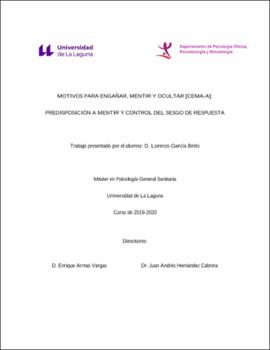Motivos para engañar, mentir y ocultar [cema-a]: predisposición a mentir y control del sesgo de respuesta
Author
García Brito, LorenzoDate
2021Abstract
El engaño está presente en nuestras vidas en diferentes formas, como la mentira o la
ocultación. Engañar está desaprobado socialmente y tiene consecuencias negativas. Engañar es
una conducta motivada, y existen diferencias individuales en dicha conducta. Al engañar a los
demás tratamos de ofrecer también una imagen socialmente deseable de nosotros mismos. Por esta
razón, y para obtener resultados válidos y fiables en los resultados de las investigaciones, se hace
necesario controlar el sesgo de respuesta a la hora de evaluar contenidos sensibles a la crítica
social. El objetivo de este trabajo es explorar diferentes motivos asociados al engaño y la mentira.
Para ello hacemos uso del Cuestionario de evaluación del Engaño, la Mentira y el Autoengaño,
forma A (CEMA-A). Analizamos algunas de sus propiedades psicométricas y su relación con las
variables de “Predisposición a Mentir” y determinadas escalas de control del sesgo de respuesta.
La muestra está formada por 240 adultos de las Islas Canarias de 18 a 73 años (Medad= 35.31 años;
DT=14.64). Del análisis factorial exploratorio se obtienen los factores: “Motivación IntrapersonalEmotividad”, “Motivación Interpersonal-Sociabilidad”, y “Motivación Egoísta-Dureza”; la
fiabilidad total es α .98 y ωj .81. Los varones obtienen mayor puntuación en “Motivación EgoístaDureza”, “Reconocimiento y Aceptación de la mentira”, “Frialdad Emocional al mentir”, y
Sinceridad; mientras que las mujeres puntúan más alto en “Autorregulación Emocional al Mentir”
y “Deseabilidad Social”. Los resultados de la regresión múltiple sugieren que, las personas que
mienten por motivos interpersonales (sociabilidad, extraversión), “admiten y aceptan que mienten”
y están más preocupadas por su imagen social. A la base de este tipo de motivos sociales, están
otros motivos más personales (emocionales). El CEMA-A se comporta como un instrumento
suficientemente válido en contenido y en convergencia representativa empírica. Deception is present in our lives in different forms, such as lies or concealment. Deceiving
is socially disapproved and has negative consequences. Deceiving is a motivated behaviour, and
there are individual differences in said behaviour. By deceiving others, we intend to provide a
socially desirable image of ourselves. For this reason, and to arrive at valid and reliable results in
research, it becomes necessary to control response biases when assessing contents sensitive to
social criticism. The aims of this study are to explore the motives for deceiving and lying. For that
purpose, we use the Questionnaire for the assessment of Deception, Lies and Concealment, form
A (CEMA-A). We analyze some of its psychometric properties and its relation to “Predisposition
to Lying” variables and some response bias scales. The sample consists of 240 adults from the
Canary Islands, from 18 to 73 years old (Mage= 35.31 years; DT=14.64). The exploratory factor
analysis identified the factors: “Intrapersonal-Emotionality Motivation”, “InterpersonalSociability Motivation”, and “Egotistic-Instrumentalization Motivation”. Total reliability is α .98
and ωh .81. Males scored higher in “Egotistic-Instrumentalization Motivation”, “Acknowledge and
Acceptance of Lying”, “Emotional Coldness when Lying”, and “Sincerity”; and women had higher
scores in “Emotional Self-Regulation when Lying” and “Social Desirability”. The results of the
multiple regression suggest that, people who lie for interpersonal motives (sociability,
extraversion), “acknowledge and accept that they lie” and are more worried about their social
image. At the core of this type of social motives, are other more personal (emotional) motives.
CEMA-A serves as a sufficiently valid test, in content and representative empirical convergence.




